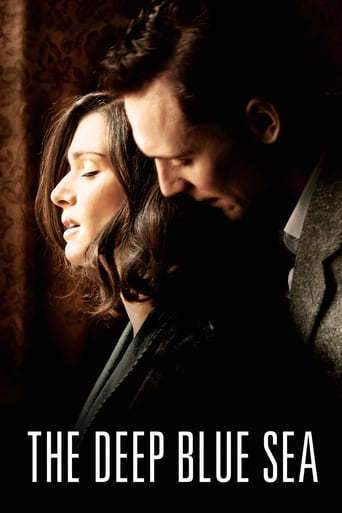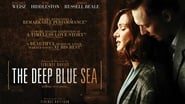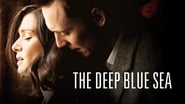TheLittleSongbird
After watching the Terence Rattigan DVD collection (with most of the adaptations being from the 70s and 80s) when staying with family friends last year, Rattigan very quickly became one of my favourite playwrights and he still is. His dialogue is so intelligent, witty and meaty, his characterisation so dynamic, complex and real and the storytelling so beautifully constructed.'The Deep Blue Sea' may not be among my favourite Rattigan plays ('The Browning Version', 'The Winslow Boy', 'Separate Tables'), but it's still wonderful and distinctively Rattigan. The writing is 24-carat Rattigan and the story is timeless in its searing emotion and romantic passion. It's very sharply observant and witty at times too. Of the four versions seen of 'The Deep Blue Sea' (this, Penelope Wilton, Vivien Leigh and Helen McCrory), this one is my least favourite, the McCrory stage version coming out on top.It certainly has its merits. Its best asset is the acting, with the creme De la creme being a stunning Rachel Weisz, a heart-breaking, passionate and sympathetic performance but with a dignity and strength that prevents Hester from being too passive. Tom Hiddleston brings charm to a very caddish role, while Simon Russell Beale successfully stops Collyer from being too one-sided and Barbara Jefford is suitably icy. Karl Johnson is a kindly Mr Miller and Ann Mitchell is solid as rocks. Weisz and Hiddleston have an intense and poignant chemistry together.Visually, 'The Deep Blue Sea' looks beautiful. Especially the sublime and hauntingly atmospheric cinematography, which perfectly complements the sumptuous, evocative period detail. Terence Davies captures the passionate intensity and searing emotion of the story very well, there are some very affecting moments here and the tea scene at the mother's house is very well written and acted and the ending is powerful.Rattigan's writing shines on the most part, heavy on talk (true of the play and Rattigan in general) but intelligent, sharply observant, thought-provoking and full of pathos and insight.However, some aspects of 'The Deep Blue Sea' frustrate annoyingly. Too often, the film mood-wise takes itself too heavily and too seriously. The play has a serious subject, but Rattigan also in the play gave it his usual wit and verve that helped it not get too heavy. This wit and verve is completely lost here and as a consequence the film feels too dark in terms of mood and overly gloomy and the leaden pace in some scenes, which felt like it was stretched to pad things out, disadvantages it further.Didn't know what to make of the music. With the pre-existing music, it is lovely music on its own but didn't fit with the film, being used in a way that felt overused and excessive that made the story more melodramatic than it actually is. Barber's beautiful Violin Concerto, played just as well by Hilary Hahn in one of the more famous interpretations of the work, is particularly true to this, on its own lovely, excessively melodramatic in how it was used in the film.First 10-15 minutes were puzzling, with images that came over as very fragmented and self-indulgent and the flashbacks don't add as much as they ought and convolute the storytelling. Those unfamiliar with the play should not be put off and think the play is like how the story is presented here, with the messing around of chronology the story felt jumbled, disjointed and incomplete here whereas the structure and character motivations (which were not explored enough here meaning that the complex characters are not as complex) are much clearer in the play.Overall, a lot of beautiful things but it was very frustrating when reminded constantly at how so much better the film could have been if told with more clarity and taken less seriously. 6/10 Bethany Cox
Ocean268
This movie is set in the 1950 and I am thinking of today in 2014. Hester is in a loveless, Mommy Dearest for a mother-in-law marriage. So she meets fun Freddie and have a great time. She spoils the great time by falling in love with Freddie. She truly believes that Freddie can rescue her from dull super rich hubby (who still loves her).After finding out the REAL Freddie, why not leave him? She could ask her hubby for money (which I am sure he would give her) and start a new life. Move out of that depressing street to another brighter area. What does trying to commit suicide proves? Did she think it will make people "Sorry" for her? Even her friends, avoid her. Hester is clearly in a type of depression. She stop having fun. Smokes a lot (which does not solve anything).Many reviewers say that Freddie did the wrong thing by leaving her. He's not married to her, so he did the right thing. If I was Freddie I would have run too. As for Freddie, lots of service men now has face "I am back from the war, what do I do now?" I guess they did not have any after war job training like we do now.Notice at the end, Hester lights the gas heater (this is the opposite at the beginning of the movie) and opens the drapes to look at a brighter morning.
JoaoPovoaMarinheiro
There's a certain fragrance of change and singularity in this piece, that not only looks for the nostalgia of past times, but also tries to implement a vivid and modern style in its aesthetic effort and symbolism.The poetry emerges in the long sequence-plans, in the editing's softness, in the conversations and dialogs, and the actor's expressions. But it's a kind of cinema that we learn to love as time passes by. Its effects are not immediate, its impact is not immediate. The appreciation comes later.What we can say is that Davies has conceived an intimate work, a powerful romantic drama. To be seen and seen again.7/10





